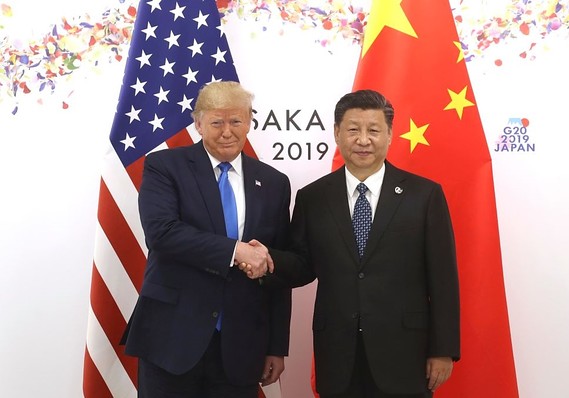 Getty
Getty
American cars, soybeans and oil are among thousands of products that China has targeted for additional tariffs, marking the latest volley in a widening trade war with the United States that has damaged the global economy and could pose a risk to President Trump’s reelection.
China on Friday said it would increase existing tariffs by 5% to 10% on more than 5,000 U.S. products in several stages starting in September. The value of these products is estimated by the Chinese Commerce Ministry to total around $75 billion.
The retaliatory move reflects the latest escalation in a trade dispute between the world’s two largest economies that began more than a year ago when the U.S. slapped tariffs on hundreds of billions of dollars of Chinese imports amid accusations of unfair trading practices. Trump contends China has been taking advantage of the U.S. for decades.
U.S. stock markets DJIA, -1.43% SPX, -1.56% fell in Friday trades.
See: Stocks retreat after China announces new tariffs; Wall Street awaits Powell’s Jackson Hole speech
The U.S. imports four and a half times as many goods from China than the other way around, but the Chinese government, as it’s done in the past, appears to be singling out American-made products largely in Midwestern states that Trump carried in the 2016 election and that he needs to win reelection.
Iowa is the largest producer of soybeans, for example, and Michigan and Ohio have the biggest concentration of auto manufacturing. Trump carried all three states in the last election, but he barely won in Michigan.
The two countries continue to negotiate, but Trump and some of his advisers believe China might be trying to wait out his administration and bank on a Democrat winning the presidency in 2020.
Just two months ago, trade talks appeared to be back on track after Trump met his Chinese counterpart, President Xi Jinping, at a gathering of world leaders in Japan in an effort to defuse tensions.
Yet frustrated by the continuing impasse, Trump in August suddenly announced a new round of tariffs on Chinese products, angering the Asian country’s leaders and drawing vows of a tit-for-tat response.
The new U.S. tariffs, which now range from 10% to 25%, are also set to take effect in September. China has scheduled its retaliatory duties to go into effect at the same time. Among other things, a 25% tariff on U.S-made cars will be reinstituted.
“The recent rise in nationalist, patriotic behavior in China means that it would have been impossible for the Chinese government not to react to the latest U.S. tariffs,” said Agathe Demarais, global forecasting director at the advisory firm The Economist Intelligence Unit.
Looked at in isolation, the U.S. would seem to have the upper hand against China. The U.S. exported just $120 billion in goods to China in 2018 and imported $539 billion in products made in China.
Read: Why the U.S.-China trade deficit is so huge: Here’s all the stuff America imports
Many countries around the world are closely tied to the Chinese economy, however, and the damaged caused by the U.S. trade fight has radiated out and harmed others.
A slowing global economy, in turn, has harmed U.S. exporters and manufacturers. A new survey of manufacturing executives, for instance, suggests the sector contracted in August for the first time since the end of the 2007-2009 Great Recession.
The threat to the U.S. economy from the trade dispute has been viewed as severe enough by the Federal Reserve to spur the central bank to cut already low interest rates in July. And the Fed is widely expected to cut rates again in September.
“Trade policy uncertainty seems to be playing a role in the global slowdown and in weak manufacturing and capital spending in the United States,” Fed Chairman Jerome Powell said Friday in a widely anticipated speech in Jackson Hole, Wy.
The Fed was not expected to take any action at its annual retreat, drawing more criticism from a president who’s been bashing the central bank for months. “My only question is, who is our bigger enemy, Jay Powel [sic] or Chairman Xi?” he tweeted.
Trump also called on American companies to stop investing or manufacturing products in China, including relocating operations back to the U.S. “We don’t need China and, frankly, would be far better off without them.”









